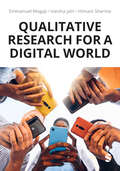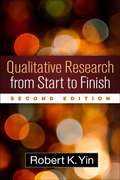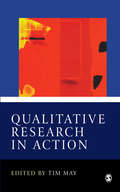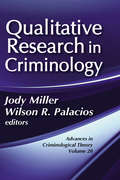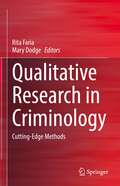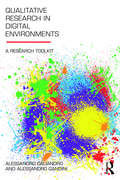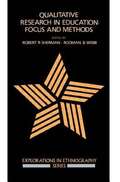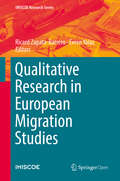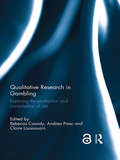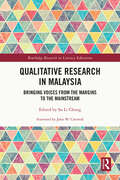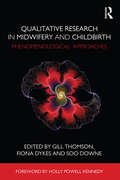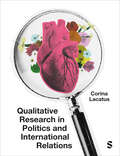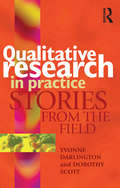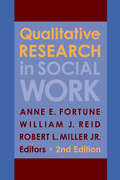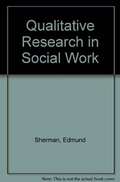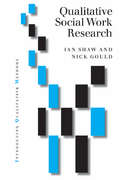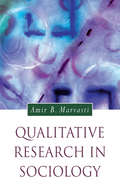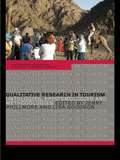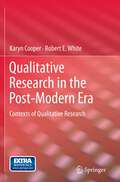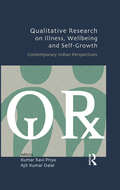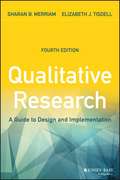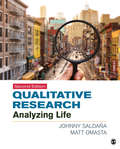- Table View
- List View
Qualitative Research for a Digital World: A Practical Guide
by Emmanuel Mogaji Varsha Jain Himani SharmaDo you want to understand and apply qualitative research methods in a digital context? This book will help you navigate the complexities of digital access and fluency, ensuring a broad lens on research methodologies. From step-by-step guides to innovative frameworks, each chapter is crafted to give you the confidence to carry out cutting-edge qualitative research. This book will provide you with · The knowledge you need to advance your qualitative research understanding across all disciplines. · A practical reflection of the application of relevant research methodologies. · An overview of research ideas, cases, and examples. With a wealth of exercises and examples, this book will become a reference point for qualitative research in the digital context by adopting a case-in-point approach for students across all social science disciplines.
Qualitative Research for a Digital World: A Practical Guide
by Emmanuel Mogaji Varsha Jain Himani SharmaDo you want to understand and apply qualitative research methods in a digital context? This book will help you navigate the complexities of digital access and fluency, ensuring a broad lens on research methodologies. From step-by-step guides to innovative frameworks, each chapter is crafted to give you the confidence to carry out cutting-edge qualitative research. This book will provide you with · The knowledge you need to advance your qualitative research understanding across all disciplines. · A practical reflection of the application of relevant research methodologies. · An overview of research ideas, cases, and examples. With a wealth of exercises and examples, this book will become a reference point for qualitative research in the digital context by adopting a case-in-point approach for students across all social science disciplines.
Qualitative Research from Start to Finish
by Robert YinThis lively, practical text presents a fresh and comprehensive approach to doing qualitative research. The book offers a unique balance of theory and clear-cut choices for customizing every phase of a qualitative study. A scholarly mix of classic and contemporary studies from multiple disciplines provides compelling, field-based examples of the full range of qualitative approaches. Readers learn about adaptive ways of designing studies, collecting data, analyzing data, and reporting findings. Key aspects of the researcher's craft are addressed, such as fieldwork options, the five phases of data analysis (with and without using computer-based software), and how to incorporate the researcher's "declarative" and "reflective" selves into a final report. Ideal for graduate-level courses, the text includes Discussions of ethnography, grounded theory, phenomenology, feminist research, and other approaches. Instructions for creating a study bank to get a new study started. End-of-chapter exercises and a semester-long, field-based project. Quick study boxes, research vignettes, sample studies, and a glossary. Previews for sections within chapters, and chapter recaps. Discussion of the place of qualitative research among other social science methods, including mixed methods research.
Qualitative Research from Start to Finish, Second Edition
by Robert K. YinThis book will help readers understand the practice of qualitative research--whether they want to do it, teach it, or just learn about it. All the major research phases are encompassed (startup, design, data collection, analysis, and composing), including newly emerging trends. Numerous easy-to-read vignettes show how other scholars have successfully implemented specific procedures. Equally distinctive, the book presents qualitative research as an adaptive craft. The array of choices among different procedures and methods enables readers to customize their own studies and to accommodate different worldviews and genres. New to This Edition: *Stronger discussion of different worldviews (e.g., constructivism, postpositivism, and pragmatism) and how they relate to different methodological choices. *Clearer emphasis on doing a generalized qualitative study, while acknowledging 12 specialized genres (e.g., action-based research, arts-based research, autoethnography, grounded theory, phenomenology, and others). *Expanded discussions of different kinds of qualitative study samples and of mixed methods. *New ideas on how to avoid getting stalled when analyzing qualitative data. *Consideration of an additional way of concluding a qualitative study: by taking action. Pedagogical Features: *Chapters start with an abstract and end with a suggested exercise. *Key terms and concepts appear in boldface throughout the text and are listed in end-of-chapter recaps as well as in the book's glossary. *Sections within each chapter start with a preview box: "What you should learn from this section." *An appendix presents a semester- or yearlong field-based project.
Qualitative Research in Action
by Tim May`This delightful book will be important to those researchers eager to extend their knowledge of qualitative research generally but specifically those keen to extend their research practice from a social-science perspective' - Nurse Researcher `This is an excellent collection at the cutting edge of thinking about qualitative research.... The breadth of coverage and the sophistication of the discussion make this an important addition to the increasing literature on qualitative work' - Jonathan Potter, Loughborough University `This book is likely to have a broad appeal to a rising generation of qualitative researchers seeking to relate theoretical debates to methodological practice' - Clive Seale, Goldsmiths College This exciting new book brings together contributions from world-leading scholars as well as younger researchers and focuses on cutting-edge issues related to the practice of qualitative research in the field. It provides a forum for contributors to discuss the issues and processes which inform qualitative research in its various forms as based on fieldwork experiences. In achieving this in an accessible manner to both practising students and researchers, it seeks to enable a dialogue over ideas and provide the reader with a `state of the art' overview of the topic from a contemporary perspective. Rather than being a `how to do' book, this volume should prove vitally useful for advanced students and researchers who wish to engage with those ideas and practices in terms of their applicability for an understanding and explanation of the place of qualitative research in the social sciences. It is also a forum in which leading scholars make an original contribution to the subject. Lively and highly readable throughout, Qualitative Research in Action will be essential reading for advanced undergraduates and above in a variety of disciplines, as well as researchers who wish to engage with contemporary ideas and practices in relation to qualitative research.
Qualitative Research in Criminology: Advances in Criminological Theory (Advances In Criminological Theory Ser.)
by Wilson R. Palacios"This volume investigates the significant role qualitative research plays in expanding and refining our understandings of crime and justice. It features seventeen original essays that discuss the relationship between methodology and theory. The result is a theoretically engaged volume that explores the approaches of qualitative scholars in the collection and treatment of data in criminological scholarship.Among the key issues addressed in the volume are methodological rigor in qualitative research; movement between method, theory building, theoretical refinement and expansion; diversity of qualitative methodologies, from classic field research to contemporary innovations; and considerations of the future of qualitative criminological research.Qualitative research use has expanded rapidly in the last twenty years. This latest volume of Advances in Criminological Theory presents a cogent appraisal of qualitative criminology and the ways in which rigorous qualitative research contributes to theorizing about crime and justice."
Qualitative Research in Criminology: Cutting-Edge Methods
by Mary Dodge Rita FariaThis volume introduces innovative and inspired qualitative methods through topics on crime commission, victimisation and crime control. It highlights how qualitative methods offer significant insights that frame our understanding of the narratives, events, theoretical perspectives, and realities of the social world.This book includes chapters discussing cutting-edge methods, which demonstrate how qualitative research can expand beyond traditional approaches. It offers diversity in research, including gender, race, and geographic sensitivities. The volume addresses a multitude of approaches for using qualitative methodologies, including innovative uses of technology mediums—such as social media, participatory videos, Zoom interviewing, and photographic visual methods—as means of collecting and co-producing relevant data on meaning. Ultimately, this book illustrates how qualitative criminology allows for deeper and more nuanced understandings of local and regional specificities in a globalized world, and how social interactions are influenced by individual interpretations, social interactions, and collective decision making.This volume is an essential read for graduate students and researchers in criminology and other social science disciplines interested in qualitative empirical research and informed policy making.
Qualitative Research in Digital Environments: A Research Toolkit
by Alessandro Gandini Alessandro CaliandroThis book offers a toolkit of methods and technologies to undertake qualitative research on digital spaces. Unlike commonly used traditional methodological strategies, which are ‘retrofitted’ to digital spaces, Qualitative Research in Digital Environments offers researchers a set of ‘digitally native’ tools that are designed for online social environments. Thanks to a broad range of cases including Louis Vuitton, YouTube and the concept of ‘hipsterism’, this text illustrates the practical applications of techniques and tools over the most popular social media environments. This book will be a valuable guide to qualitative research for marketing students, researchers and practitioners, as well as a central reference point for tutors in the growing field of Digital Sociology.
Qualitative Research in Education: Focus and Methods
by Robert R. Sherman Rodman B. WebbQualitative research has had a thorough-going and controversial impact on the field of educational research, both generally and specifically. Qualitative approaches have colonised, or have been colonised by, almost all theoretical varieties of educational research. Such variation and varigation is evidenced and documented in this volume. But this kind of enthusiastic development and take up has its dangers and problems. The potential of qualitative methods can be blunted or distorted by the cavalier abandonment of first principles or disregard for techniques or rigour. In this collection of papers a careful and systematic review is provided of the current possibilities and necessities of good qualitative research.
Qualitative Research in European Migration Studies (IMISCOE Research Series)
by Ricard Zapata-Barrero Evren YalazThis open access book covers the main issues, challenges and techniques concerning the application of qualitative methodologies to the study of migration. It discusses theoretical, epistemological and empirical questions that must be considered before, during, and after undertaking qualitative research in migration studies. It also covers recent innovative developments and addresses the key issues and major challenges that qualitative migration research may face at different stages i.e. crafting the research questions, defining approaches, developing concepts and theoretical frameworks, mapping categories, selecting cases, dealing with concerns of self-reflection, collecting and processing empirical evidence through various techniques, including visual data, dealing with ethical issues, and developing policy-research dialogues. Each chapter discusses relative strengths and limitations of qualitative research. The chapters also identify the main drivers for qualitative research development in migration studies. It is a unique volume as it brings together a multidisciplinary perspective as well as illustrations of different issues derived from the research experience of the recognized authors. One additional value of this book is its geographic focus on Europe. It seeks to explore theoretical and methodological issues that are raised by distinctive features of the European context. This volume will be a useful reference source for scholars and professionals in migration studies and in social sciences as well. The publication is also addressed to graduate and post-graduate students and, more generally, to those who embark on the task of doing qualitative research for the first time in the field of migration.
Qualitative Research in Gambling: Exploring the production and consumption of risk
by Rebecca Cassidy Andrea Pisac Claire LoussouarnThe Open Access version of this book, available at http://www.tandfebooks.com, has been made available under a Creative Commons Attribution-Non Commercial-No Derivatives 3.0 license. Gambling is both a multi-billion-dollar international industry and a ubiquitous social and cultural phenomenon. It is also undergoing significant change, with new products and technologies, regulatory models, changing public attitudes and the sheer scale of the gambling enterprise necessitating innovative and mixed methodologies that are flexible, responsive and ‘agile’. This book seeks to demonstrate that researchers should look beyond the existing disciplinary territory and the dominant paradigm of ‘problem gambling’ in order to follow those changes across territorial, political, technical, regulatory and conceptual boundaries. The book draws on cutting-edge qualitative work in disciplines including geography, organisational studies, sociology, East Asian studies and anthropology to explore the production and consumption of risk, risky places, risk technologies, the gambling industry and connections between gambling and other kinds of speculation such as financial derivatives. In doing so it addresses some of the most important issues in contemporary social science, including: the challenges of studying deterritorialised social phenomena; globalising technologies and local markets; regulation as it operates across local, regional and international scales; and the rise of games, virtual worlds and social media.
Qualitative Research in Malaysia: Bringing Voices from the Margins to the Mainstream (Routledge Research in Literacy Education)
by Su Li ChongThis edited volume is a systematic collection of research initiatives in the qualitative research paradigm. It showcases how researchers in Malaysia, who are often expected to acquiesce to mainstream ways of designing, conducting and disseminating research, rise above methodological hegemony to carve out a different but meaningful path in order to represent the voice of the voiceless.In this book, accounts of paradigmatic shifts, applications of philosophical rigour and attention to values-laden inquiry demonstrate how qualitative research can be successfully conducted and reported, revealing insights which profoundly re-shape research design and address ethical sensitivities in social research. The conclusions drawn from the chapters form the rallying cry of qualitative researchers who acknowledge that it is their responsibility to enlighten those who are gatekeepers to the national research agenda, about the strength and legitimacy of the qualitative research paradigm. From a global standpoint, this book functions as a foil to show how in a context not systematically underpinned by critical dialogues of Western philosophy nor the ideology of research paradigms, significant considerations positioned within Eastern concepts of knowledge production can still thrive. The integration of both Eastern and Western perspectives at the crossroads of Asian-based qualitative research offers important lessons that are useful for supervisory, teaching and learning purposes.This volume will be relevant to qualitative research methodology educators and researchers from across the Sciences and Humanities as well as practitioners in any industry that involves human thought and behaviour.
Qualitative Research in Midwifery and Childbirth: Phenomenological Approaches
by Soo Downe Gill Thomson Fiona DykesQualitative research, particularly phenomenology, is increasingly popular as a method for midwifery and health-related research. These approaches enable rich and detailed explanations to be uncovered and bring experience to life. Important recommendations and practice- based implications may then be raised and debated for future use. This book brings together a range of phenomenological methods and insights into one accessible text. Illustrated with plenty of examples of successful phenomenological research, Qualitative Research in Midwifery and Childbirth keeps the focus applied to midwifery and childbirth and makes clear the links to practice throughout. The book introduces three key phenomenological approaches – descriptive, interpretive and the life world – and includes a comparative chapter which discusses the differences between these varied perspectives and methods. Each chapter focuses on how these approaches are used within midwifery research. The remaining chapters present a number of different research projects. These demonstrate how different phenomenological approaches have been used to explore and uncover experiences of childbirth and maternity as well as offering important insights into how women experience different facets of the birth experience during the antenatal, intra-partum and postnatal period. Designed for researchers and students undertaking research projects on midwifery and childbirth, this text includes contributions from a range of international and highly regarded phenomenological authors and researchers.
Qualitative Research in Politics and International Relations: A practical and pluralist guide
by Corina LacatusThis groundbreaking textbook is the essential introduction to qualitative research for politics and international relations. Presented in a refreshingly accessible manner, this text applies a practical approach to help you learn by doing and will equip you with the tools to get researching. Embrace a pedagogical approach that seamlessly integrates theoretical insights with hands-on guidance, empowering you to navigate the complexities of qualitative research with confidence and clarity. Key Benefits Include: · Practical Approach: bid farewell to abstract learning with practical tools and exercises that instil intuition and proficiency. Step-by-step support for students grappling with the logistical intricacies of research design, data collection, and analysis. · Close Links to the Disciplines: immerse yourself in the latest seminal research and learn how to select robust qualitative designs for your research questions. · Demystify Theory and Methodology: this text addresses the perennial challenge of aligning theory with methodology, providing a cohesive framework for qualitative research. · Expert Guidance: for educators seeking to incorporate this invaluable resource into their curriculum, a complementary online teaching guidebook offers guidance and suggestions on how to truly engage with the material and enrich the learning experience for your students. An essential companion for undergraduate students navigating qualitative methods modules to postgraduate students and researchers shaping their research projects. Corina Lacatus is a Senior Lecturer in Global Governance at the School of Politics and International Relations, Queen Mary University of London.
Qualitative Research in Politics and International Relations: A practical and pluralist guide
by Corina LacatusThis groundbreaking textbook is the essential introduction to qualitative research for politics and international relations. Presented in a refreshingly accessible manner, this text applies a practical approach to help you learn by doing and will equip you with the tools to get researching. Embrace a pedagogical approach that seamlessly integrates theoretical insights with hands-on guidance, empowering you to navigate the complexities of qualitative research with confidence and clarity. Key Benefits Include: · Practical Approach: bid farewell to abstract learning with practical tools and exercises that instil intuition and proficiency. Step-by-step support for students grappling with the logistical intricacies of research design, data collection, and analysis. · Close Links to the Disciplines: immerse yourself in the latest seminal research and learn how to select robust qualitative designs for your research questions. · Demystify Theory and Methodology: this text addresses the perennial challenge of aligning theory with methodology, providing a cohesive framework for qualitative research. · Expert Guidance: for educators seeking to incorporate this invaluable resource into their curriculum, a complementary online teaching guidebook offers guidance and suggestions on how to truly engage with the material and enrich the learning experience for your students. An essential companion for undergraduate students navigating qualitative methods modules to postgraduate students and researchers shaping their research projects. Corina Lacatus is a Senior Lecturer in Global Governance at the School of Politics and International Relations, Queen Mary University of London.
Qualitative Research in Practice: Stories from the field
by Dorothy Scott Yvonne Darlington'Qualitative Research in Practice brings alive wonderfully the business of carrying out qualitative research in the field of welfare and human services. The authors take the reader through the main stages of the research endeavour, cleverly using their own interviews with eminent investigators to illustrate with great immediacy the actual mechanics of the process as described by recognised experts.'Professor David Howe, School of Social Work and Psychosocial Studies, University of East Anglia, Norwich, UK.'.very useful and invaluable for social work students and social workers.'Joyce L. C. Ma, R.S.W. Ph.D., Professor, Department of Social Work, The Chinese University of Hong KongQualitative Research in Practice bridges the gap between theory and practice for researchers in the human services. The authors explore qualitative research through actual research projects that illustrate key stages in the research process. The researchers' 'stories from the field' reveal the human face of research undertaken in often difficult contexts: with homeless people, with disabled people, in nursing homes, with victims of domestic violence, and with adopted children. We see how these leading researchers from different countries deal with the many obstacles they face in their research projects, and how they develop innovative solutions. Qualitative Research in Practice is a valuable resource for students and practitioners doing research in social work, welfare, community health, counselling and related fields.
Qualitative Research in Social Work
by Jr. William J. Reid Robert Miller Anne FortuneIn this volume, progressive experts survey recent trends in qualitative study, which relies on small sample groups and interview data to better represent the context and complexity of social work practice. Chapters address different approaches to qualitative inquiry, applications to essential areas of research and practice, integration of qualitative and quantitative methods, and epistemological issues. This second edition brings even greater depth and relevance to social work qualitative research, including new material that tackles traditional research concerns, such as data quality, ethics, and epistemological stances, and updated techniques in data collection and analysis. To increase the usefulness for students and researchers, the editors have reorganized the text to present basic principles first and then their applications, and they have increased their focus on ethics, values, and theory. New and revised illustrative studies highlight more than ever the connection between effective research and improved social functioning among individuals and groups. The collection continues to feature scholars and practitioners who have shaped the social work research practice canon for more than twenty years, while also adding the innovative work of up-and-coming talent.
Qualitative Research in Social Work
by William J. Reid Edmund ShermanIn this volume, progressive experts survey recent trends in qualitative study, which relies on small sample groups and interview data to better represent the context and complexity of social work practice. Chapters address different approaches to qualitative inquiry, applications to essential areas of research and practice, integration of qualitative and quantitative methods, and epistemological issues. <p><p> This second edition brings even greater depth and relevance to social work qualitative research, including new material that tackles traditional research concerns, such as data quality, ethics, and epistemological stances, and updated techniques in data collection and analysis. To increase the usefulness for students and researchers, the editors have reorganized the text to present basic principles first and then their applications, and they have increased their focus on ethics, values, and theory. New and revised illustrative studies highlight more than ever the connection between effective research and improved social functioning among individuals and groups. The collection continues to feature scholars and practitioners who have shaped the social work research practice canon for more than twenty years, while also adding the innovative work of up-and-coming talent.
Qualitative Research in Social Work (Introducing Qualitative Methods #113)
by Dr Nick Gould Professor Ian Shaw`A really fine book... an impressive work that adds much to the development of the use of qualitative methodology in social work research' - William J Reid, University at Albany 'The back cover of the book proclaims that "Qualitative Research in Social Work will be essential reading for all students, practitioners and researchers undertaking social work research." That just about sums it up for me' - British Journal of Social Work `This book is a significant milestone in the development of social work research. It is characterized by an unparalleled command of the field of qualitative research in social work, and by a commitment to an understanding of the demands and potential of day-to-day social work practice' - Mike Fisher, Director of Research, National Institute for Social Research `Qualitative Research in Social Work edited by Ian Shaw and Nick Gould, provides a state-of-the-art exposition and analysis of qualitative inquiry in relation to social work.... The book has an unusual degree of coherence for one with several authors. The five chapters by the editors (parts one and three) do an exceptional job of providing the necessary background information and setting the context for the six application chapters and of highlighting and discussing the issues raised in those chapters. The editors are respected scholars well-versed in the theory and practice of qualitative research. Similarly, the contributing authors represent both considerable experience in this field and a diversity of interests. This combination makes Qualitative Research in Social Work an excellent text for students, practitioners, and researchers alike. It is a benchmark for social work progress in this area and points the way for the continued development of qualitative inquiry' - Professor Stanley L Witkin, Department of Social Work, University of Vermont There is a clear need for a book which treats qualitative research as a substantive theme within social work, setting epistemological and methodological issues in a context whereby the agenda is set by, and is relevant to, social work. Qualitative Research in Social Work is just such a book and will be immensely useful for students, practitioners and researchers interested in and undertaking social work research. In the introductory chapters the co-authors set qualitative research within a context of social work developments and problems. The central section provides additional topicality and directness through specially commissioned chapters from leading figures in this field each covering key qualitative methods and relating them to social work settings, and the final section which reviews qualitative research in social work, and aims to exemplify ways in which social work thought and practice can be advanced through research.
Qualitative Research in Sociology (Introducing Qualitative Methods)
by Amir B. Marvasti'The book is an extremely valuable resource for students and new researchers who embark on qualitative research in sociology and the social sciences. It will be a valuable source for those who teach qualitative research methods in not only the social sciences but also in other disciplines, including health science. I wholeheartedly recommend this book' - Australian Journal of Primary Health Qualitative Research in Sociology offers a hands-on guide to doing qualitative research in sociology. It provides an introductory survey of the methodological and theoretical dimensions of qualitative research as practised by those interested in the study of social life. Through a detailed yet concise explanation, the reader is shown how these methods work and how their outcomes may be interpreted. Practically focused throughout, the book also offers constructive advice for students analysing and writing their research projects. Key features of the book include: · An innovative framework - combining different methodologies and approaches. · A variety of `real-life' examples and case studies - enriches the book for the reader · A set of practical exercises in each chapter - pedagogical and student-focussed throughout. · International in focus - offers a wide-ranging set of approaches and debates · A broad coverage - includes discussions of ethnography, visual analysis, ethical issues, discourse and conversation analysis and report-writing The book has a flowing narrative and student-friendly structure which makes it accessible to and popular with students. It will be an invaluable resource for students and researchers, helping them to undertake effective qualitative research in both sociology and courses in social research across the social sciences.
Qualitative Research in Tourism: Ontologies, Epistemologies and Methodologies (Contemporary Geographies of Leisure, Tourism and Mobility)
by Lisa Goodson Jenny PhillimoreThe first to focus solely upon qualitative research in tourism, this book combines discussions of the philosophies underpinning qualitative research, with reflexive chapters that demonstrate how these techniques can be used. Incorporating a range of case studies written by leading international scholars, this book makes clear the ways in which these pieces of research have been informed by the authors' epistemological, ontological and methodological standpoint. Based on a range of empirical tourism studies set in the context of theoretical discussion, it demonstrates the benefits of using a range of qualitative approaches to research tourism, exploring the ways in which a number of techniques, including participants observation, memory work, biographical diaries, focus groups and visual exercises, have been adopted by researchers from a range of disciplinary backgrounds to undertake empirical research in tourism. An indispensable text for final year undergraduates, Masters and PhD students embarking on research in the field, it also will be a valuable title for academics with an interest in either tourism research or qualitative methodology. Linking theory with research practice, it offers a holistic account of qualitative research in tourism.
Qualitative Research in the Post-Modern Era
by Robert E. White Karyn CooperQualitative Research is changing as a result of postmodern influences which have changed the way research is interpreted and understood. This has prompted questions which have been knocking at the door of qualitative research for some time now: Who is the researcher in this research account? How does the researcher relate to his/her research? How can the researcher who reads qualitative research relate to and understand the nuances and complexities in qualitative research? How can this volume help us to, not only describe, effect and manage change, but help us to understand, imagine and affect policies, practices and procedures related to research? What can we learn from researchers at the top of their stride who have struggled in order to develop qualitative research? The book includes illustrative interviews with world famous scholars. William Pinar, Norman Denzin, Henry Giroux, Zygmunt Bauman and Maxine Greene invite the student to engage reflectively and to figure out the rudiments and connections of research methodology and methods for theses. The developed so called "The Five Contexts" serves as a theoretical framework for conducting, understanding and interpreting qualitative research in a variety of disciplines in this post-modern era .
Qualitative Research on Illness, Wellbeing and Self-Growth: Contemporary Indian Perspectives
by Kumar Ravi Priya Ajit Kumar DalalThis book examines the theoretical, methodological and practical dimensions of Qualitative Research in the study of illness, wellbeing and self-growth in the Indian context. Using wide-ranging narratives, interviews, group discussions, and cultural analyses, it offers a social and psychological understanding of health and therapy.
Qualitative Research: A Guide To Design And Implementation
by Sharan B. Merriam Elizabeth J. TisdellPraise for the Third Edition of Qualitative Research: "Sharan B. Merriam synthesizes twenty years of developments in qualitative research with clarity and acumen." ?Michael Quinn Patton, author, Qualitative Research and Evaluation Methods "Here is a qualitative research methods book that reinforces the connection between professional experience and qualitative inquiry." ?Robert Stake, author, The Art of Case Study Research and Multiple Case Study Analysis "In this new edition, Sharan Merriam once again presents the world of qualitative research in language engaging and accessible?for new and experienced readers alike. If you can have only one book about qualitative research, this is it!" ?Patricia M. Reeves, associate professor, School of Social Work, University of Georgia "Mystified by qualitative research? You couldn't ask for a better guide than Sharan Merriam, who introduces you to the fundamental concepts of this research method, explains its complex forms, and then shows you exactly how to do a high-quality qualitative study." ?M. Carolyn Clark, coeditor, The International Journal of Qualitative Studies in Education
Qualitative Research: Analyzing Life
by Johnny Saldana Matt OmastaQualitative Research: Analyzing Life, Second Edition presents a fresh approach to teaching and learning qualitative methods for social inquiry—one that focuses on analysis from the very beginning of the text. By exploring qualitative research through a unique analytic lens, then cumulatively elaborating on methods in each successive chapter, this innovative work cultivates a skill set and literacy base that prepares readers to work strategically with empirical materials in their own fieldwork. Johnny Saldaña and Matt Omasta combine clear, accessible writing and analytic insight to show that analysis, in its broadest sense, is a process undertaken throughout the entire research experience. The Second Edition provides a number of updates including more on digital materials and methods, including sentiment analysis of social media data, and ethics in social media research.
